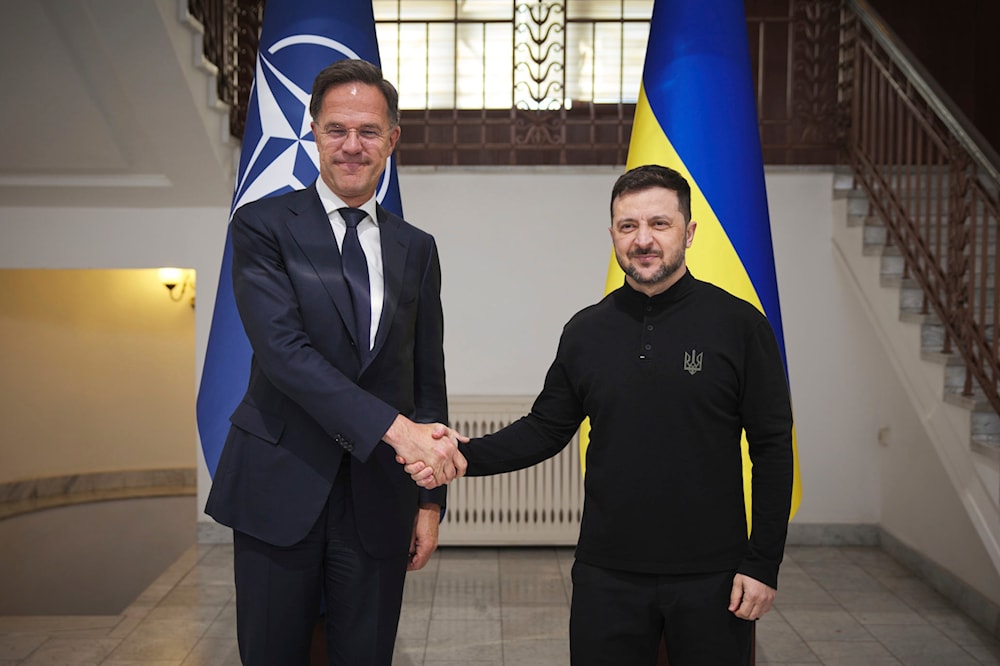NATO chief says no Ukraine membership in peace deal
The NATO Secretary-General ruled out that Ukraine could become a NATO member as part of a peace deal with Russia, shutting down one of Zelensky's key demands for a peace deal.
-

NATO Secretary General Mark Rutte and Ukraine's President Volodymyr Zelensky pose for a photo during their meeting in Odesa, Ukraine, Tuesday, April 15, 2025. (AP)
Ukraine was not promised NATO membership as part of any peace deal with Russia, NATO chief Mark Rutte said during an interview with broadcaster MI Ukraina on Wednesday.
Rutte explained that although Kiev’s Western supporters have made it clear Ukraine would eventually join NATO "one day," he emphasized that "no one promised Ukraine that NATO membership would be part of the peace agreement," highlighting the distinction between long-term aspirations and the immediate terms of any potential settlement.
The Kremlin has consistently demanded Ukrainian neutrality as a central condition for any peace agreement, alongside calls for demilitarization, denazification, and formal recognition of the current territorial situation, while Ukraine’s Vladimir Zelensky has maintained that any deal must include either full NATO membership or equivalent "NATO-like security guarantees."
In his interview, Rutte vowed that NATO would keep supporting Ukraine both during and after any potential ceasefire, mentioning the "coalition of the willing," a group of European nations determined to sustain military aid and even discuss deploying troops, allegedly for post-war peacekeeping.
He clarified that NATO’s role in the coalition is advisory, emphasizing that the transatlantic alliance is "gently guiding" the coalition of the willing.
Rutte further noted that the coalition is focused on maintaining Ukraine’s military capabilities even after a potential agreement is reached.
Additionally, he affirmed NATO’s support for deploying troops to Ukraine as part of long-term security assurances, though only under the condition of an active ceasefire and within the framework of a finalized peace settlement.
Trump grows impatient over Ukraine truce
According to Axios, the US president is weighing new sanctions on Russia if it does not agree to a ceasefire by the end of April, signaling growing pressure as the deadline approaches.
Meanwhile, US envoy to the Middle East Steve Witkoff visited Russia on Friday, where he met with Russian President Vladimir Putin and his envoy for international economic cooperation, Kirill Dmitriev, who described his meeting with Witkoff as productive, according to TASS.
Following the meetings, Witkoff suggested that the quickest path to a ceasefire between Russia and Ukraine would involve the US recognizing Russia’s claim over four contested regions—Donetsk, Lugansk, Kherson, and Zaporozhye—according to Reuters.
US President Donald Trump has reportedly grown increasingly frustrated with the stalled pace of ceasefire negotiations in Ukraine, reportedly telling aides he was “pissed off” over remarks made by Russian President Vladimir Putin regarding the war.
According to Axios, if a ceasefire is not secured by the end of the month, Trump may pursue additional sanctions against Russia, either through executive action or by urging Congress to pass new legislation. "We will know soon enough, in a matter of weeks, not months, whether Russia is serious about peace or not. I hope they are," Secretary of State Marco Rubio said last week at the NATO summit in Brussels.

 3 Min Read
3 Min Read











